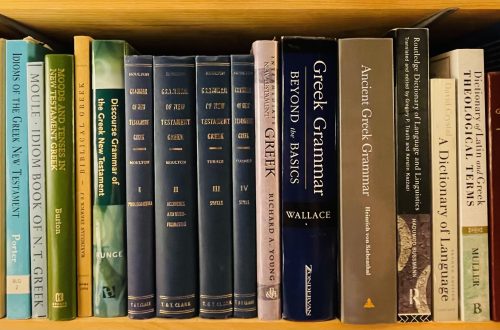 Are we all cessationists? Jim Hamilton says we are in an interesting essay on the cessation of the gift of apostleship. His conclusion:
Are we all cessationists? Jim Hamilton says we are in an interesting essay on the cessation of the gift of apostleship. His conclusion:
“So it seems to me that everyone who thinks that there are no more Apostles like Peter and Paul thinks that at least one spiritual gift has ceased. It seems, then, that this discussion is simply over the degree of cessationism that we hold, because anyone who holds that there is no one in the church today with the same kind of authority possessed by Peter and Paul believes that the gift of Apostle has ceased. In conclusion, it seems to me that, at least as it regards the gift of Apostleship, all protestants are really cessationists. If they are not, they can, in principle, add to the New Testament.”
Read the whole article here.




22 Comments
Wonders for Oyarsa
Reading this sort of thing makes me tempted to convert to Catholicism or Orthodoxy.
Ferg
So does God not even speak now? Did he stop revealing after Paul? If God woke me up in the middle of the night last night to pray for my friends ears (he did) as they were damaged (unbeknownst to me), is this not new knowledge that the Lord has revealed to me. One of his dear children needs healing and he wanted me to join him in the process. Or I guess perhaps I should be locked up in a padded cell!!
Kevin J
I think there is some confusion here as to the difference between insipration of scripture and God speaking to one of his children about praying for someone in need.
Since God told me last week to write a letter to my brother-in-law, would that make it “scripture”? Did God “direct” me to write it? Yes. Did God give me the words to say? Yes. Is it to be added to the New Testament? No. I am not an apostle.
Jim Peet
Wow … helpful article.
Happy Friday!
Ferg
thanks kevin. no need to be smart but i appreciate your reply. What God told you to do is still truth and i still think God speaks to people. when he does its truth. and truth can be taken as scripture.
Jordan
Hamilton’s note about being able to add to the NT is a bit troubling. While that was not his main point, it still seems to ignorantly neglect the formation of the NT canon. There were plenty of “books” that some of our cherished early church fathers counted as scripture (or even “inspired”) that were not written by apostles but by those who were considered bishops (or disciples of the apostles). At any rate, I find his comment a little misleading, and after reading the comments here, it obviously created some conflict and confusion.
Quixote
I’m with Jordan…who said that a qualifier for an “apostle” was writing what we consider scripture? And who said that a qualifier for writing what we consider Scripture is to be an apostle? Can someone help me out?
Moses wasn’t an apostle. Neither was Isaiah. Was the writer of Hebrews? I’m confused.
MatthewS
Protestants, but what about Baptists? I seem to recall Caner saying he isn’t a protestant… 😉
BrianW
What I’m somewhat confused by is why this man would risk offending “friends” with so much conjecture? It seems he has a cessationist bent calling into question the legitimacy of his “friends” experience of the Spirit. Much of his exegesis is speculation like who the apostles are (much more narrowly then I think; I think 1 Cor. 15:7 does broaden who an apostle would be), why he refers to apostleship strictly as “gift” when Paul almost always refers to “the spirituals” or the “things of the Spirit” in 1 Cor. 12 (which, in my view, implies to me that Paul has a much broader idea than our narrow category of “spiritual gifts”). Even Fee, the most respected scholar on 1 Cor. today, says Paul seems to mean much more than “giftedness” in 1 Cor. 12:27ff, but also implies “office”.
I appreciate his earlier wisdom, keeping these thoughts a little more private in the comforts of his class; it seems he should have stuck with that initial thought.
Andrew
What is he adding to the debate by writing this article? Most every evangelical you talk to, even the ones who affirm the “sign gifts” for today, would not say that there are modern day apostles. I don’t think he’s really saying anything or proving or disproving anything by pointing this out. Whether or not there are apostles today does not affect the debate over tongues or other sign gifts.
Denny Burk
Andrew,
I think what he is trying to say is that Continuationists are inconsistent. The arguments that they use in favor of continuationism should also be applied to the gift of apostleship if they were to be consistent. But they don’t (by and large) apply them to the gift of apostleship. I think Jim would say that at the very least the sovereign grace charismatics are themselves a kind of cessationist.
Thanks,
Denny
Todd B.
Doesn’t Rom 16:7 suggest that there were more apostles besides the 12 and Paul?
Nick
Actually, Sovereign Grace is consistent, as they do indeed believe that the office of apostle continues today. C. J. Mahaney, in fact, is considered an apostle within the movement. So I don’t think Hamilton’s argument will do anything here.
Matt Svoboda
Nick,
I don’t believe that you are correct about Mahaney and Sovereign Grace. Can you show evidence for your statement?
Matt
D. Taylor Benton
Denny,
being an EX SBC guy and now an SGM guy, I have thoroughly read all the positions on the gifts. That being said, I think Hamilton on one hand understands what Harvey is trying to say but on other hand there is MUCH more to what Harvey believes and also what represents as beliefs from SGM’s standpoint.
I think it would be consistent in Saying the Harvey (and SGM) would say the role and gifting of an Apostle still are active today, but in clarity would agree that no one in today’s Church has been strongly gifted as the “original” Apostles. This can be attributed to many circumstances including the canonical issues.
I know this may not be on topic but I could guess that Hamilton also misunderstands SGM’s view on prophecy as well. I have found that many of the SBC, PCA, etc.. Academians and theologians don’t quite understand some of the “terminology” and the actual viewpoints get lost in translation. I know this may not be the case always because I know for a fact that Mohler, Ligon, Dever, and Piper I think fully understand SGM’s “terminology”. But for the rest of them when I was at SBTS, after I had made it “public” that I felt called to SGM, I had several profs come up to me and ask me some of these same questions.
It seems to me since I have been in the SGM, everyone one “on the outside” are a bit timid and make assumptions based on almost a hearsay theology of SGM. that is just an observation I have being on “the other side”.
D. Taylor Benton
Matt,
Nick is correct to an extent… i know I just posted about this but there are several men within SGM that are considered to have “Apostolic Leadership” which means that we don’t call them Apostles like you would call someone a pastor but they are on the “Apostolic Leadership Team” and would function in that role.
Ferg
I wonder is Todd Bentley an apostle? :o)
D. Taylor Benton
c’mon now ferg,
to even joke at that is an insult to SGM. we ARE REFORMED and CHARISMATIC…NOT just CHARISMATIC…
Lucas Knisely
Isn’t apostleship directly linked to seeing Jesus after his resurrection? And the gifts linked to the moving of the Holy Spirit? An inconsistent parallel will no doubt lead to a conclusion that the view of continuation is inconsistent.
D. Taylor Benton
Lucas,
I would agree with you IF that is you criteria for what an Apostle is. I don’t think that one would draw such an “inconsistent” parallel as as you propose and this points to my earlier comment…
“I know this may not be on topic but I could guess that Hamilton also misunderstands SGM’s view on prophecy as well. I have found that many of the SBC, PCA, etc.. Academians and theologians don’t quite understand some of the “terminology†and the actual viewpoints get lost in translation. I know this may not be the case always because I know for a fact that Mohler, Ligon, Dever, and Piper I think understand SGM’s “terminologyâ€. But for the rest of them when I was at SBTS, after I had made it “public†that I felt called to SGM, I had several profs come up to me and ask me some of these same questions.”
Lucas Knisely
It is an inconsistent parallel/link because the qualifications for an apostle are spelled out in Acts 1. And the gifts, whether they’ve ceased or not, are nowhere linked to the Apostleship of the 12 or of Paul. The gifts are linked to the Holy Spirit, which I’m hoping even Cessationists believe is still working today.
It is a non-functioning parallel/link to say, “If the gifts haven’t stopped then neither has the gift of Apostleship.” And what’s this wording, “gift of Apostleship”? Being an Apostle was a special calling to a specific role, not a gift of the Holy Spirit that came and went intermittently. One is a role/position in the church while the gifts are temporary acts carried out within the church that have no bearing/contingency on role/position. The differences here are so large I can’t believe anyone would parallel/link the two and hope that nobody would notice.
Don Johnson
There are the 12 and there are apostles, which include the 12. The 12 are special and need to be exactly 12 to map to the 12 tribes.
The ministry of apostles continues to this day, many call them missionaries.